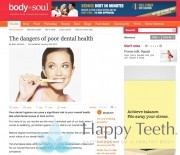
Dangers of Poor Dental Health
Poor dental hygiene can pose a significant risk to your overall health. See what dental issues to look out for.
For many of us, our mouths are the most overlooked part of our body when it comes to wellbeing, yet dental hygiene can be vital to our overall health.
Beyond regular brushing and occasional visits to the dentist, few of us take much notice of our dental health.
Yet what takes place within our mouth (that crucial, bacteria-laden intake point for our nourishment and air supply) can indicate serious underlying complaints.
“The teeth and the entire mouth give us important clues as to what may be happening in a person’s body,” says Sydney-based holistic dental surgeon Dr Nader Malik. “For example, a holistic dentist may see dental erosion being strongly linked to acid reflux or mineral imbalance, or chronic sinus congestion resulting from a poor tooth-to-jaw relationship.”
These five dental issues can tell us a lot about our overall health.
1. Dry mouth
This condition, which occurs when there isn’t enough saliva in the mouth, can accelerate tooth decay. “It isn’t a disease in itself, but rather a symptom of some underlying and more concerning issue,” says Dr Nader. “It often results from certain drugs or medications, treatments for cancer, or from auto-immune diseases such as AIDS.”
Dehydration, nerve problems, Parkinson’s disease and diabetes are other significant medical conditions that can result in dry mouth.
2. Grinding teeth
Grinding your teeth (bruxism) might simply be an indication that your teeth are misaligned or fillings are too high. But it’s also common in people who are emotionally stressed, angry or anxious, the cause of more serious health issues.
“Some of the many factors believed to trigger bruxism in susceptible people include mental concentration, stresses such as illness, nutritional deficiency or dehydration, or drug misuse, particularly amphetamines,” concludes Dr Lester.
3. Inflamed gums
Gum inflammation (gingivitis) is easy to treat but, if unaddressed, can lead to more serious periodontitis. Symptoms include bad breath, bleeding, swollen and receding gums, and eventually tooth loss.
Considerable research links periodontitis to a risk of heart disease and strokes. “An increase in cavities and gum disease could also be a sign of high blood glucose,” says Steven James from the Australian Diabetes Council. “People with diabetes have an increased risk of oral complications, so it’s vital that both diabetes and oral health are managed.”
4. Mouth ulcers
Mouth ulcers are usually caused by burns or bites and last just a few days, but ulcers that don’t clear up need medical treatment. They might indicate infectious diseases such as herpes simplex (cold sores), syphilis, cancer of the lip, or various auto-immune diseases.
Other irregularities on your lips, gums, tongue and insides of your mouth could be signs of oral cancer. These irregularities include red or white patches, permanent ulcers, hard spots and numbness. If they don’t heal within a few days it’s advisable to see a doctor as soon as possible. Oral cancers can occur on the lips, tongue, pharynx and oral cavity and are life-style related. More than three-quarters of oral cancers are caused by excessive tobacco and alcohol consumption.
5. Tooth decay
Diet is a significant factor in tooth decay so, if you’re losing teeth or have a lot of caries that require fillings, consult a nutritionist about a balanced diet.
Medications can also be harmful to dental health.
“Estimates suggest that about 40 per cent of people take at least one type of medicine that could damage their teeth,” says Dr Rosemary Lester, Acting Chief Health Officer for Victoria. “These include antihistamines, aspirin, asthma medications and syrups, as well as illegal drugs.”
